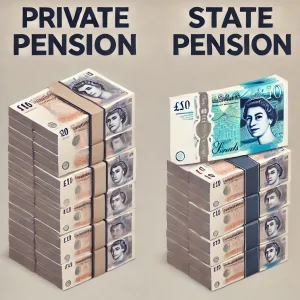
Understanding UK State Pensions
Unlike private pensions, UK State Pensions provide a fixed amount based on eligibility. Private pensions come from salary contributions, often matched by employers. However, state pensions depend on National Insurance (NI) contributions. While private pensions are accessible from age 55, UK State Pensions start later—currently at 66, rising to 67 by 2026-28 and 68 by 2044-46.
If you reached state pension age before 2016, you receive around £221.20 per week. This amount has increased over time but still falls short for many retirees. Without a private pension, maintaining your current lifestyle could be challenging. While some might manage on a basic pension, middle and high earners would likely experience a steep decline in living standards after retirement.
The Growing Concern Over UK State Pensions
Reports suggest UK State Pensions may not be sustainable. Increasing the retirement age delays payouts, but it doesn’t solve the problem. The government is pushing for more private pension participation, using auto-enrollment to encourage workers to save. Despite these efforts, many retirees still rely heavily on state pensions, raising concerns about future funding.
The UK pension system is highly fragmented, with thousands of different funds managing around £2 trillion in assets. Experts argue these funds are underutilized, failing to maximize investment potential. The government’s recent pension reform plan, known as “The Big Bang,” aims to change this by shifting pension investments toward high-growth UK companies. However, the transition will take time, and the effectiveness of this strategy remains uncertain.
Why UK Pension Holders Should Consider QROPS
For UK expats in India, transferring your pension through a QROPS (Qualifying Recognised Overseas Pension Scheme) can provide better financial security. Here’s why:
- Higher Growth Potential: The Indian economy is one of the fastest-growing in the world. Investing your pension in India may yield better long-term returns.
- Tax Efficiency: UK pensions are taxed under UK laws, but a QROPS transfer can help reduce your tax burden.
- More Flexibility: QROPS schemes allow greater control over investments, letting you choose options suited to your financial goals.
- Avoiding Currency Risks: Keeping your pension in GBP exposes you to exchange rate fluctuations. Transferring to INR provides stability if you plan to retire in India.
- Better Estate Planning: UK pensions are subject to inheritance tax. A QROPS transfer helps ensure your beneficiaries receive the full value of your pension.
Final Thoughts
The future of UK State Pensions remains uncertain. Delayed retirement ages and fragmented funds make long-term sustainability questionable. If you’ve lived and worked in the UK but plan to retire in India, transferring your pension through QROPS could be a smarter financial move. Instead of waiting for policy changes, take control of your pension and invest in a high-growth economy today.
